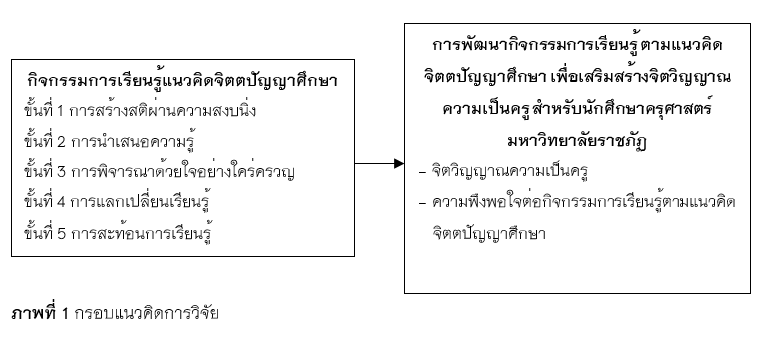การพัฒนากิจกรรมการเรียนรู้ตามแนวคิดจิตตปัญญาศึกษา เพื่อเสริมสร้างจิตวิญญาณความเป็นครู สำหรับนักศึกษาครุศาสตร์ มหาวิทยาลัยราชภัฏ
Main Article Content
บทคัดย่อ
การศึกษาครั้งนี้มีวัตถุประสงค์เพื่อ 1) ศึกษาแนวทาง กิจกรรม และวิธีการจัดกิจกรรมการเรียนรู้ตามแนวคิดจิตตปัญญาศึกษาเพื่อเสริมสร้างจิตวิญญาณความเป็นครู สำหรับนักศึกษาครุศาสตร์ มหาวิทยาลัยราชภัฏ 2) สร้าง และตรวจสอบคุณภาพของกิจกรรมการเรียนรู้ตามแนวคิดจิตตปัญญาศึกษาเพื่อเสริมสร้างจิตวิญญาณความเป็นครู สำหรับนักศึกษาครุศาสตร์ มหาวิทยาลัยราชภัฏ 3) เพื่อทดลองการใช้กิจกรรมการเรียนรู้ตามแนวคิดจิตตปัญญาศึกษาเพื่อเสริมสร้างจิตวิญญาณความเป็นครู สำหรับนักศึกษาครุศาสตร์ มหาวิทยาลัยราชภัฏ กลุ่มตัวอย่างคือ นักศึกษาชั้นปีที่ 1 คณะครุศาสตร์ มหาวิทยาลัยราชภัฏอุตรดิตถ์ จำนวน 30 คน โดยวิธีการสุ่มตัวอย่างแบบง่าย เครื่องมือที่ใช้ในงานวิจัย ประกอบด้วย 1) แบบสัมภาษณ์แนวทาง กิจกรรม และวิธีการจัดกิจกรรมการเรียนรู้ตามแนวคิดจิตตปัญญาศึกษา 2) กิจกรรมและแผนจัดการเรียนรู้ตามแนวคิดจิตตปัญญาศึกษา เพื่อเสริมสร้างจิตวิญญาณความเป็นครู 3) แบบวัดจิตวิญาณความเป็นครู 4) แบบประเมินความเหมาะสมกิจกรรมการเรียนรู้ 5) แบบบันทึกการเรียนรู้ และ 6) แบบประเมินความพึงพอใจ วิเคราะห์ข้อมูลเชิงคุณภาพโดยการวิเคราะห์เนื้อหา และวิเคราะห์ข้อมูลเชิงปริมาณโดยหาค่าร้อยละ ค่าเฉลี่ย และส่วนเบี่ยงเบนมาตรฐาน ทดสอบความแตกต่างระหว่างก่อนทดลองและหลังทดลอง โดยใช้ t-test แบบ Dependent
ผลการวิจัยพบว่า 1) แนวทางจัดกิจกรรมการเรียนรู้ตามแนวคิดจิตตปัญญาศึกษาเพื่อพัฒนาจิตวิญญาณความเป็นครู ได้แก่ การพัฒนาความฉลาดทางสติปัญญา ความฉลาดทางอารมณ์ ความฉลาดทางศีลธรรม จริยธรรม และการมีสำนึกที่ดีต่อสังคม กิจกรรมการเรียนรู้ ได้แก่ กิจกรรมฝึกสติ กิจกรรมแลกเปลี่ยนเรียนรู้ สุนทรียสนทนา การฟังอย่างลึกซึ้ง การเขียนบันทึก การน้อมสู่ใจอย่างใคร่ครวญ และการสะท้อนความคิด วิธีการจัดกิจกรรมการเรียนรู้ ได้แก่ การเรียนรู้ด้วยตนเอง การเรียนรู้เป็นกลุ่ม การเรียนรู้จากการปฏิบัติจริง และการเรียนรู้แบบบรรยาย 2) กิจกรรมการเรียนรู้ตามแนวคิดจิตตปัญญาศึกษาเพื่อเสริมสร้างจิตวิญญาณความเป็นครู สำหรับนักศึกษาครุศาสตร์ มหาวิทยาลัยราชภัฏ ประกอบด้วย 9 กิจกรรม จัดกิจกรรมการเรียนรู้ 5 ขั้นตอน ได้แก่ ขั้นที่ 1 การสร้างสติผ่านความสงบนิ่ง ขั้นที่ 2 การนำเสนอความรู้ ขั้นที่ 3 การพิจารณาด้วยใจอย่างใคร่ครวญ ขั้นที่ 4 การแลกเปลี่ยนเรียนรู้ และขั้นที่ 5 การสะท้อนการเรียนรู้ กิจกรรมการเรียนรู้มีประสิทธิภาพ 81.18/84.33 สูงกว่าเกณฑ์ที่กำหนด 75/75 และ 3) กลุ่มตัวอย่างมีคะแนนจิตวิญญาณความเป็นครูหลังเรียนสูงกว่าก่อนเรียนแตกต่างกันอย่างมีนัยสำคัญทางสถิติที่ระดับ .05 มีจิตวิญญาณความเป็นครูอยู่ในระดับมาก และมีความพึงพอใจต่อกิจกรรมการเรียนรู้ตามแนวคิดจิตตปัญญาศึกษาเพื่อเสริมสร้างจิตวิญญาณความเป็นครู อยู่ในระดับมากที่สุด
Downloads
Article Details

อนุญาตภายใต้เงื่อนไข Creative Commons Attribution-NonCommercial-NoDerivatives 4.0 International License.
เอกสารอ้างอิง
Banyat, P. (2021). The construction of teacher’s spiritual measurement for students in faculty of education. (Doctoral dissertation, Research and Evaluation for Educational Development, Uttaradit Rajabhat University Thailand).
Buasonth, R. (2019). Research and development of educational innovation. Bangkok: Chulalongkorn Publishing.
Chantarat, W., Atisabda, W., Kaosaiyaporn, O. and Rorbkorb, N. (2020). The results of using research supervision model with technology information to the ability to conduct research in the classroom of teachers under Primary Educational Service Area Office in southern border provinces towards knowledge and skills and teachers' satisfaction with conducting research in the classroom. Journal of Education Prince of Songkla University, 31(2), 211-226. [in Thai]
Chimphokhlang, K. (2022). The program of enhancing teaching management of contemplative education for Kalasin Primary Educational Service Area office 2. (Master thesis, Educational Administration and Development, Mahasarakham University Thailand).
Funfuengfu, W. (2019). The success of active learning management. Humanities and Social Science, 9(2), 135-145. [In Thai]
Huaysai, N., Viriyapong, N., and Chiangpradit, M. (2021). The development of learning activities according to the problem solving process of Polya that promotes the ability to solve mathematical problems on one variable linear equations of junior high school students 1. Journal of Education Burapha University, 32(2), 120-132. [In Thai]
Lomarak, T, and Naunsay, B. (2019). Professional development process integrated research-based learning, contemplative education, and coaching and mentoring for In-service teachers. Journal of Research and Development, Buriram Rajabhat University, 14(2), 57-73. [In Thai]
Mahawong, P., Chularut, P., Jarernvongrayab, A., Kuawmuang, S. (2019). The development of a teacher spirituality scale of student teachers at Rajabhat University. Hatyai Academic Journal, 17(2), 201-220. [In Thai]
Paksa, P. (2020). Contemplative education: Learning activity for students in higher education. Journal of Education, Mahasarakham University, 14(4), 7-18.
Poolpan, N. (2019). Developing management in science course for pre-service science teachers. Faculty of Education Phetchabun Rajabhat University.
Pordee, P. (2021). Happy learning pattern. Journal of human society, 11(1), 78-90. [In Thai]
Prakankaew, A. (2020). The effect of experience management based on contemplative education affecting young children’s gratitude behaviors. (Master thesis, Early Childhood Education, Phranakhon Rajabhat University Thailand).
Pusueng, P. (2020). A development of English learning ability through m- learning on unseen Phitsanulok for enhance English reading comprehension for grad 10 students. (Master thesis, Curriculum and Instructional, Naresuan University Thailand).
Siritapon, P. and Kulisara, J. (2021). Factors influencing students in choosing to study in the Faculty of Education. Uttaradit: Rajabhat Uttaradit University.
Srichai, K. (2022). Developing of learning model based on Trisikkha principles with contemplative education to enhance the characteristics of good citizenship for vocational certificate students. (Doctoral dissertation, Curriculum and Instructional, Mahasarakham University).
Sricha, Y. and Piyakult, A. (2020). The development of emotional quotient of mathayomsuksa 1 students using contemplative education activities. Journal of GraduateSchool, 17(77), 149-157. [in Thai]
Srisa-ard, B. (2019). Preliminary research. Bangkok: Suweeriyasan.
Tongphae, W. (2019). A development of self coaching on contemplative education training program for instructional Chang of students intern. Thepsatri Rajabhat University.
Thammapiwat, P., Jeerungsuwan, N., and Piriyasurawong, P. (2022). Development of learning model based on contemplation education to encourage ethics of industrial technician profession. Technical Education Journal: King Mongkut’s University of Technology North Bangkok, 13(3), 182-188. [In Thai]
Udomphol, B. (2019). The learning management based on active learning and the contemplative education to enhance instructional design ability of student teachers Faculty of Education, Rattanakosin Rajabhat University group. Nakhon Lampang Buddhist, 8(1), 179-188. [in Thai]
Wiriyarampa, W. (2019). Application of contemplative education and developmental supervision in supervision process professional experience training of teacher students. In The 11th NPRU National Academic (p.1127). July 11-12, 2019. Nakhon Pathom: Nakhon Pathom Rajabhat University
Yasothara, T., Chomdokmai, M., and Tongson, P. (2022). Pre-service teacher training curriculum development to enhance spirituality for teacher student. (Doctoral dissertation, Curriculum and Instructional, Burapha University Thailand).
Yimprasert, S. (2019). The development of instructional model with contemplative education to enhance public consciousness of Mattayom 4 students. (Master thesis, Curriculum and Instructional, Bansomdejchopraya Rajabhat University Thailand).


